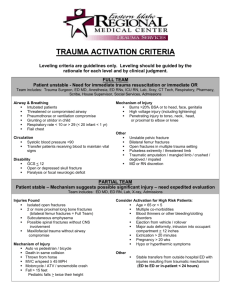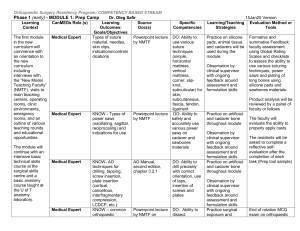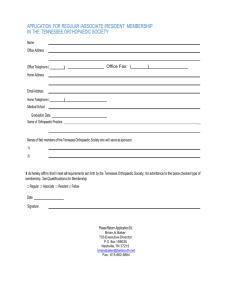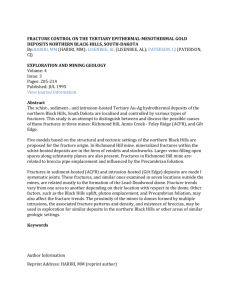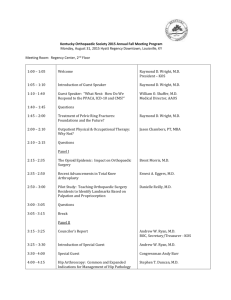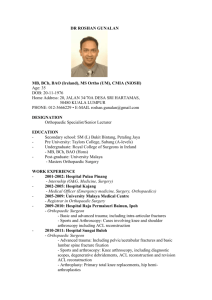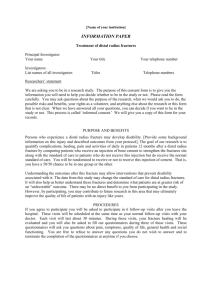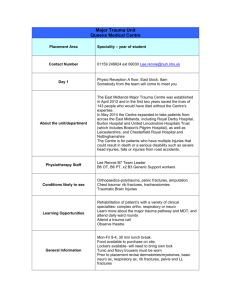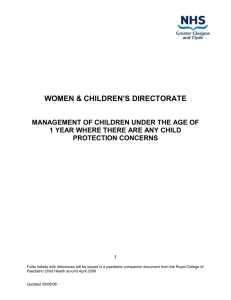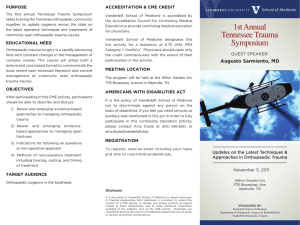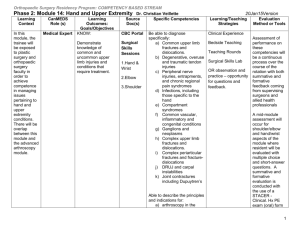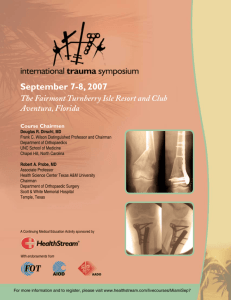Module 10 - Paediatric Fractures - PGME
advertisement
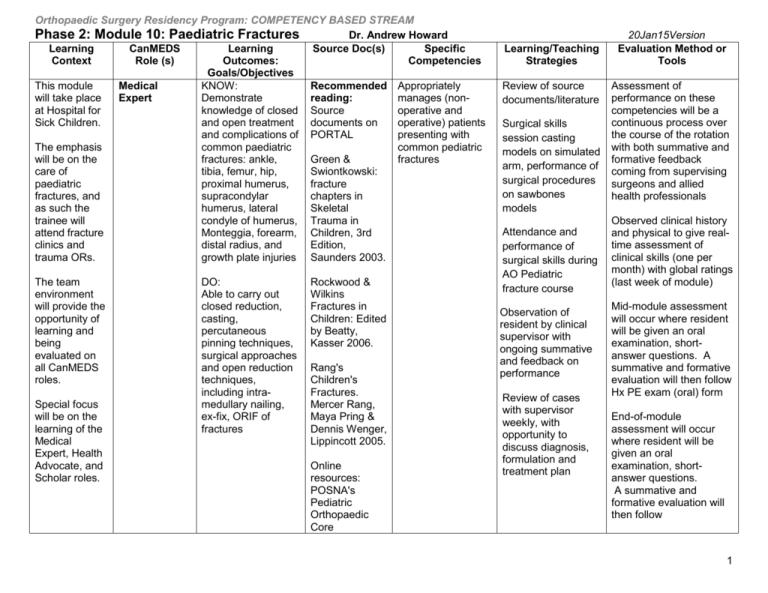
Orthopaedic Surgery Residency Program: COMPETENCY BASED STREAM Phase 2: Module 10: Paediatric Fractures Dr. Andrew Howard Learning CanMEDS Learning Source Doc(s) Specific Context Role (s) Outcomes: Competencies Goals/Objectives Medical Recommended Appropriately This module KNOW: Expert reading: will take place Demonstrate manages (nonat Hospital for knowledge of closed Source operative and Sick Children. and open treatment documents on operative) patients and complications of PORTAL presenting with The emphasis common paediatric common pediatric will be on the fractures: ankle, Green & fractures care of tibia, femur, hip, Swiontkowski: paediatric proximal humerus, fracture fractures, and supracondylar chapters in as such the humerus, lateral Skeletal trainee will condyle of humerus, Trauma in attend fracture Monteggia, forearm, Children, 3rd clinics and distal radius, and Edition, trauma ORs. growth plate injuries Saunders 2003. The team environment will provide the opportunity of learning and being evaluated on all CanMEDS roles. Special focus will be on the learning of the Medical Expert, Health Advocate, and Scholar roles. DO: Able to carry out closed reduction, casting, percutaneous pinning techniques, surgical approaches and open reduction techniques, including intramedullary nailing, ex-fix, ORIF of fractures Rockwood & Wilkins Fractures in Children: Edited by Beatty, Kasser 2006. Rang's Children's Fractures. Mercer Rang, Maya Pring & Dennis Wenger, Lippincott 2005. Online resources: POSNA's Pediatric Orthopaedic Core Learning/Teaching Strategies Review of source documents/literature Surgical skills session casting models on simulated arm, performance of surgical procedures on sawbones models Attendance and performance of surgical skills during AO Pediatric fracture course Observation of resident by clinical supervisor with ongoing summative and feedback on performance Review of cases with supervisor weekly, with opportunity to discuss diagnosis, formulation and treatment plan 20Jan15Version Evaluation Method or Tools Assessment of performance on these competencies will be a continuous process over the course of the rotation with both summative and formative feedback coming from supervising surgeons and allied health professionals Observed clinical history and physical to give realtime assessment of clinical skills (one per month) with global ratings (last week of module) Mid-module assessment will occur where resident will be given an oral examination, shortanswer questions. A summative and formative evaluation will then follow Hx PE exam (oral) form End-of-module assessment will occur where resident will be given an oral examination, shortanswer questions. A summative and formative evaluation will then follow 1 Orthopaedic Surgery Residency Program: COMPETENCY BASED STREAM Phase 2: Module 10: Paediatric Fractures Dr. Andrew Howard Learning CanMEDS Learning Source Doc(s) Specific Context Role (s) Outcomes: Competencies Goals/Objectives Curriculum for Orthopaedic Residents www.posna.org/ members/coreC urr/coreCurricul um.cfm Learning/Teaching Strategies An ITER will be filled out at the end of module at the time of the exit interview Direct observation by the supervisor and feedback Casting instructional video (to be obtained from Lucas Murnaghan) Direct Documented Observation of the following: Closed reduction forearm/wrist # (surgeon) Closed reduction & pinning FHSC (surgeon) Intramedullary fixation of a long bone (may be functioning as assistant) Arthrotomy/Arthroscopy and irrigation of joint for infection Open reduction and internal fixation Attendance at AO Pediatric Fracture course Health Advocate Able to describe and recognize child abuse CPSO Legislation Children’s Aid Society information package SCAN team 20Jan15Version Evaluation Method or Tools Uses appropriate communication with patient, caregiver, consultants – can describe the evaluation of indicators of child abuse and create a plan for care and Residents will engage with all caregivers associated with SCAN team, etc. in cases where child abuse is suspected Observed interaction with standardized patient scenario – scenario to be developed – refer to SCAN team Residents will 2 Orthopaedic Surgery Residency Program: COMPETENCY BASED STREAM Phase 2: Module 10: Paediatric Fractures Dr. Andrew Howard Learning CanMEDS Learning Source Doc(s) Specific Context Role (s) Outcomes: Competencies Goals/Objectives information protection of child package/debrief ing (to be organized) Scholar Able to prepare a journal club on a specific topic Demonstrate the ability to do selfdirected learning and perform a critical appraisal of the literature University of Toronto Library presentation and guides (from A Howard) Search, retrieve, screen, and critically appraise papers on a clinical topic of choice Organize, present, and moderate a journal club on a topic of the resident’s own choosing Learning/Teaching Strategies 20Jan15Version Evaluation Method or Tools identify 1 case and describe a plan for care/protection of child Review source literature One-on-one teaching session with A. Howard at beginning of module Direct Observation Evaluation of resident’s preparatory process and presentation during Journal Club Present literature search plan and critical appraisal process for journal club to A. Howard at the end of rotation 3
